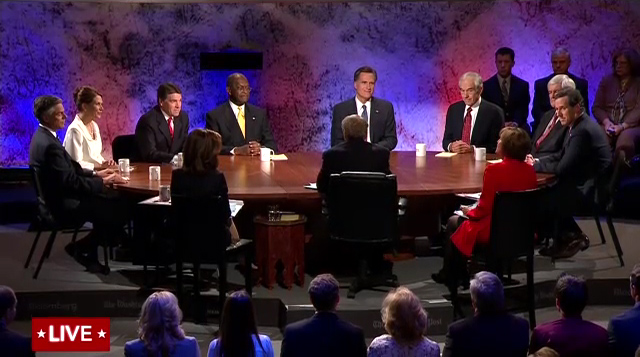- Home « Pre-Primary Period
« Primary
Debates
and
Forums « Bloomberg/The
Washington
Post
Republican
Presidential
Debate
Primary Debates and Forums
Sponsors: Bloomberg Television, The Washington Post, WBIN-TV and Dartmouth College.
Candidates: Rep. Michele Bachmann, Herman Cain, former Speaker Newt Gingrich, former Gov. Jon Huntsman, Rep. Ron Paul, Gov. Rick Perry, former Gov. Mitt Romney, and former Sen. Rick Santorum.
Moderator:
Charlie
Rose,
executive
editor
and
anchor
of Charlie Rose. Julianna Goldman of
Bloomberg TV and Karen Tumulty of
the Washington Post
joined Rose to pose questions.
Audience:
Over
860
people;
tickets
distributed
among the four partners,
approximately 40% to Dartmouth, 20% each to the other three, and some
off the top to each of the campaigns.
Broadcast: Nationally and internationally by Bloomberg Television, streamed online by Washingtonpostlive.com, and broadcast throughout New Hampshire and Massachusetts by WBIN-TV in Derry, NH.
Format:
90
minutes.
"...devoted
to
the
single
subject
of
the
U.S.
economy."
"The
debate
will
be
conducted
in a roundtable format
with candidates sitting side-by-side with the moderators, surrounded by
the audience. This unique debate format is intended to foster an
interactive discussion between the candidaates on their economic and
fiscal policies." The debate included a segment where each
candidate asked a
question of another candidate of his or her choice.
Overview:
Following
his
win
in
the Presidency 5 straw poll in Orlando, FL several weeks ago,
Herman
Cain has risen to the top tier of candidates. His 9-9-9 plan was
a central focus of discussion, and it came under close scrutiny.
Cain rebutted a Bloomberg Government finding that his plan is not
revenue neutral. "The problem with that analysis is that it is
incorrect," he stated. Michele Bachmann argued that "the last
thing you would do is give Congress another pipeline of a revenue
stream." "[W]hen you take the 999 plan
and you turn it upside down, I think the devil is in the
details," she said. Rick Santorum pointedly asked, "How many
people here are for a sales tax in New
Hampshire? Raise your hand."
The candidate-to-candidate questions
offered insights
into the dynamics of the race. Four of the eight questions went
to Romney, the frontrunner. Two went to Cain, the new top-tier
candidate. The questions were quite pointed, with one
exception—Mitt Romney lobbed a softball to Michele Bachmann.
• Bachmann asked Perry:
"How can we trust you to not go down the Obama way and
overspend and pay for that spending with indebtedness on the
backs of the next generations?"
• Cain asked Romney:
"Can
you name all 59
points in your 160-page plan, and does it satisfy that
criteria of being simple, transparent, efficient, fair, and
neutral?"
• Gingrich asked
Romney: "...I think it’s about page
47 of your plan - that you have a capital gains tax cut for
people under $200,000, which is actually lower than the Obama
model...So, I’m curious, what was the rationale for setting an
even lower base marker than Obama had?
• Huntsman asked
Romney: "Since some might see you because of your past employment
with Bain Capital as more of a financial engineer, somebody
who breaks down businesses, destroys jobs, as opposed to
creating jobs and opportunity, leveraging up, spinning off,
enriching shareholders, since you were number 47 as governor
of the state of Massachusetts, where we were number one, for
example, and the whole discussion around this campaign is
going to be job creation, how can you win that debate given
your background?"
• Paul asked Cain about
full auditing of the Federal Reserve: "Do you still stick by this, that
that this is
frivolous, or do you think it’s very important? Sixty-four
percent of the American people want a full audit of the Fed
on a regular basis."
• Perry asked Romney:
"Governor Romney, your chief economic adviser,
Glenn Hubbard, who you know well, he said that Romneycare was
Obamacare. And Romneycare has driven the cost of
small-business insurance premiums up by 14 percent over the
national average in Massachusetts. So my question for you
would be: How would you respond to his criticism of your
signature legislative achievement?"
• Romney asked
Bachmann: "What - what would you do - beyond the tax policies you
describe - to get people back to work?"
• Santorum asked Cain:
"My question is, since I think
Herman Cain is giving naively a tool in his 999 plan of
giving Washington a huge new tax burden - tax opportunity to
get money through a sales tax, can we trust you that with
your lack of experience that you won’t continually give
Washington the ability to take freedom away from
freedom-loving people here in the 'live free or die!' state?"
Exclusion of candidates and unequal time for candidates were problems. The three candidates who have spent the most time campaigning in the state—Gary Johnson, Buddy Roemer and longshot Fred Karger—were not on the stage. Wes Hemings' analysis on his "Dawn of the Weak" blog found the Mitt Romney accounted for a bit more than 25-percent of the candidate speaking time. As the Union Leader's John DiStaso wrote in his "Granite Status" column, "[T]his was not really a 'New Hampshire' debate. It was a Washington, D.C.-style production that just happened to be held in New Hampshire."
Notes
1. See Debates at Dartmouth
page.
2. Analysis by the website "Dawn
of
the
Weak" of candidate talking time during the debate
found that Romney had 16:10 of total talk time (25.63%) followed by
Perry (8:49), Bachmann (8:17), Cain (7:36), Gingrich (6:19), Huntsman
(5:47), Paul (5:13), and Santorum (4:53).


